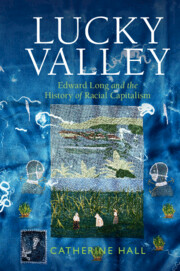Book contents
- Reviews
- Lucky Valley
- Critical Perspectives on Empire
- Lucky Valley
- Copyright page
- Dedication
- Contents
- Colour Plates
- Figures
- Maps
- Acknowledgements
- A Note on Language
- Prologue
- Maps and Family Tree
- Introduction
- Part I Growing up English
- Part II The Lineaments of Racial Capitalism
- 3 The Plantation
- 4 The Merchant House
- 5 Reproducing Capital: the Long Family
- Part III Making a Slave Society
- Epilogue
- Bibliography
- Index
- Plate Section (PDF Only)
5 - Reproducing Capital: the Long Family
from Part II - The Lineaments of Racial Capitalism
Published online by Cambridge University Press: 11 January 2024
- Reviews
- Lucky Valley
- Critical Perspectives on Empire
- Lucky Valley
- Copyright page
- Dedication
- Contents
- Colour Plates
- Figures
- Maps
- Acknowledgements
- A Note on Language
- Prologue
- Maps and Family Tree
- Introduction
- Part I Growing up English
- Part II The Lineaments of Racial Capitalism
- 3 The Plantation
- 4 The Merchant House
- 5 Reproducing Capital: the Long Family
- Part III Making a Slave Society
- Epilogue
- Bibliography
- Index
- Plate Section (PDF Only)
Summary
The productive and reproductive labour of the enslaved produced one form of capital; the gendered organization of marriage and inheritance amongst the planters and merchants produced another. If families such as the Longs were to survive, secure their land and increase their wealth, they had to reproduce themselves and ensure the continuity of their line: their hope was to establish a dynasty. Elite colonists reproduced the patterns of the landed English gentry, but with a difference, given their ownership of enslaved people. Merchants tended towards partible inheritance. Property was gendered in such a way as to try to assure the creation and accumulation of wealth. The work of white women was to produce heirs and bring capital to a marriage. Long believed in the importance of maintaining pure English blood and had clear views as to how ‘proper’ marriages and forms of family life were essential for an ordered colonial society. He abhorred the scale of miscegenation and illegitimacy and the irregular relations that characterized Jamaica. He loved his wife and children, and did much to support his mother and siblings. At the very same time, he refused those relationships to the enslaved and disavowed any connection between his family and those of the Africans on his plantation: they were naturally different.
- Type
- Chapter
- Information
- Lucky ValleyEdward Long and the History of Racial Capitalism, pp. 202 - 262Publisher: Cambridge University PressPrint publication year: 2024



